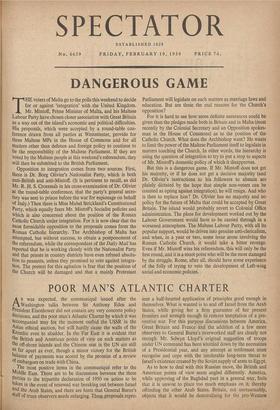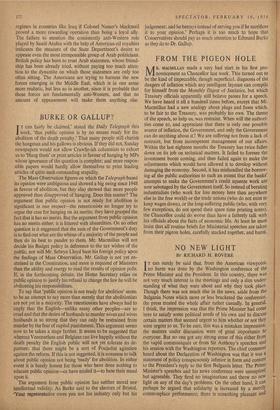POOR MAN'S ATLANTIC CHARTER
As was expected, the communique issued after the Washington talks between Sir Anthony Eden and President Eisenhower did not contain any very concrete policy decisions, and the poor man's Atlantic Charter by which it was accompanied may for the moment outbid the USSR in the Asian ethical auction, but will hardly cause the walls of the Kremlin even to shudder. In the, Far East it is evident that the British and American points of view on such matters as the off-shore islands and the Chinese seat in the UN are still as far apart as ever, though a minor victory for the British balance of payments was scored by the prothise of a review Of embargoes on trade with China. The most positive items in the communique refer to the Middle East. There are to be discussions between the three parties to the tripartite declaration of 1950 on fiction to be taken in the event of renewed war breaking out between Israel and the Arab States, and there are hints that General Burns's staff of truce observers needs enlarging. These proposals repre- sent a half-hearted application of principles good enough in themselves. What is wanted is to seal off Israel from the Arab States, while giving her a firm guarantee of her present frontiers and strength enough to remove temptation of a pre- ventive war. For this purpose discussions between America, Great Britain and France and the addition of a few more observers to General Burns's overworked staff are clearly not enough. Mr. Selwyn Lloyd's original suggestion of troops under UN command has been whittled down by the necessities of a Presidential year, and any attempt at settlement must recognise and cope with the intolerable long-term threat to Israel's existence created by the Soviet supply of arms to Egypt.
As to how to deal with this Russian move, the British and American. points of view seem angled differently. America, while approving of the Baghdad pact in a general way, feels that it is unwise to place too much emphasis on it; thereby offending the other Arab States. Britain. not unreasonably, objects that it would be demoralising for the pro-Western regimes in countries like Iraq if Colonel Nasser's blackmail proved a more rewarding operation than being a loyal ally. The failure to mention the consistently anti-Western role played by Saudi Arabia with the help of American oil royalties indicates the measure of the State Department's desire to appease even the most irresponsible group of Arab politicians. British policy has been to trust Arab statesmen, whose friend- ship has been already tried, without paying too much atten- tion to the dynamite on which those statesmen are only too often sitting. The Americans are trying to harness the new forces emerging in the Middle EaSt. which is in one sense more realistic, but less so in another, since it is probable that those forces are fundamentally anti-Western, and that no amount of appeasement will make them anything else.



































 Previous page
Previous page